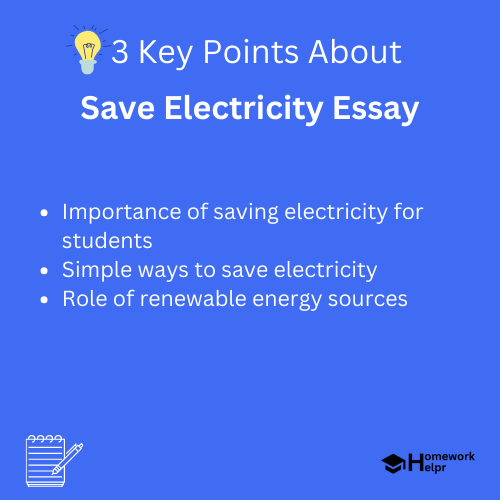📝 Summary
In today’s world, saving electricity is a vital responsibility for students and children. It is crucial for energy conservation and protecting our environment. By adopting simple habits, young individuals can reduce electricity demand, conserve natural resources, and cut energy costs. This essay outlines practical tips, such as turning off lights, unplugging devices, and using energy-efficient appliances. Additionally, creating awareness and incorporating renewable energy sources like solar power can lead to a substantial impact. Every action counts in promoting a sustainable future for our planet.
Save Electricity: A Crucial Responsibility for Students and Children
In today’s world, the significance of saving electricity cannot be overstated. As students and children, it is essential to understand the various ways we can contribute to energy conservation. Saving electricity not only fosters a sense of responsibility but also plays a crucial role in protecting our environment. This essay will explore the importance of saving electricity and provide practical tips that young individuals can implement in their daily lives.
Why Is Saving Electricity Important?
Electricity is a vital energy source that powers our homes, schools, and communities. However, the increasing demand for electricity has led to several problems, including energy shortages, rising costs, and environmental degradation. By adopting energy-saving habits, we can:
- Reduce the demand for electricity
- Conserve natural resources used for electricity generation
- Minimize greenhouse gas emissions contributing to climate change
- Cut energy costs for families
Definition
Greenhouse gases: Gases that trap heat in the atmosphere, leading to global warming.
Understanding Electricity Consumption
Before diving into ways to save electricity, it is important to comprehend how we consume it. The majority of electricity is generated from fossil fuels, such as coal, oil, and natural gas, which have detrimental impacts on the environment. Additionally, renewable energy sources like solar, wind, and hydroelectric power offer a more sustainable alternative. Educating ourselves about these energy sources can help in making better choices.
Examples
For instance, using a solar charger for your electronic devices instead of plugging them into the wall saves both energy and reduces your carbon footprint.
Simple Ways to Save Electricity at Home
Even small actions can lead to significant energy savings. Here are some practical tips students can encourage their families to adopt:
- Turn off lights when leaving a room.
- Unplug chargers and appliances when not in use.
- Use energy-efficient LED bulbs instead of traditional incandescent lights.
- Limit the use of air conditioning and opt for fans instead.

Saving Electricity in School
Students can also play a significant role in conserving electricity at school. They can:
- Encourage classmates to switch off lights and computers after use.
- If possible, initiate a school project focused on energy conservation.
- Participate in school-wide campaigns promoting electricity saving.
- Utilize natural light by opening blinds instead of using artificial lights.
❓Did You Know?
Did you know that with just an hour of switching off your devices, you can save enough electricity to power a refrigerator for over a week?
Understanding Energy-Efficient Appliances
One of the most effective ways to save electricity is by using energy-efficient appliances. These devices are designed to consume less energy while providing the same functionality. When shopping for appliances, look for the energy star rating, which indicates that the product meets energy efficiency standards.
Examples
For example, using an energy-efficient refrigerator can save you up to 50% more energy compared to older models.
Definition
Energy Star: A certification program that helps consumers identify energy-efficient products.
Creating Awareness Among Peers
Creating awareness about the importance of saving electricity amongst peers is vital. Students can hold presentations, participate in school assemblies, or create informative posters around school to spread the message effectively. Engaging friends and family in discussions can foster a culture of energy conservation.
Incorporating Renewable Energy Sources
Another essential aspect of saving electricity involves exploring ways to incorporate renewable energy sources in our daily lives. Although it may not be feasible to install solar panels at a young age, spreading awareness about their benefits can encourage responsible energy consumption.
- Introduce concepts of solar energy in class discussions.
- Use solar-powered gadgets like lights and calculators.
- Visit local renewable energy plants during school trips.
Examples
Students can also compete in projects aimed at creating models of solar-powered gadgets to understand the concept better and appreciate renewable energy.
Conclusion
In conclusion, saving electricity is not just an individual’s responsibility but a collective one that involves the whole society. As students and children, you have the power to influence family and peers by adopting and promoting energy-saving habits. Equip yourselves with knowledge about energy conservation and advocate for innovative solutions that utilize renewable energy sources. Remember, every small step counts, and your contribution can significantly impact our planet’s future! Let’s all join hands and work towards a greener, more sustainable world.
Related Questions on Save Electricity Essay for Students and Children
Why is saving electricity essential?
Answer: It reduces demand and protects the environment.
What are energy-efficient appliances?
Answer: Devices that consume less energy while functioning efficiently.
How can students promote electricity saving at school?
Answer: By encouraging classmates and participating in energy campaigns.
What can individuals do to create awareness?
Answer: Hold presentations and distribute informative posters.
